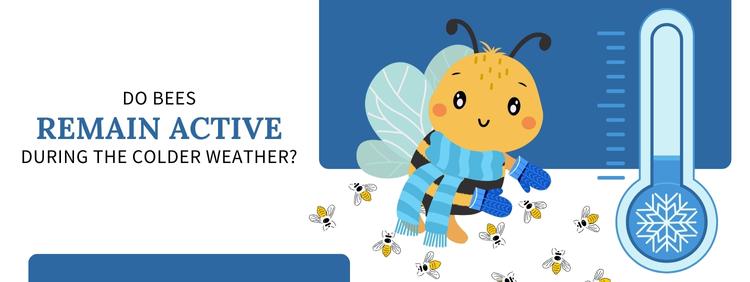Guelph Pest Control: Do Bees Remain Active During the Colder Weather?

Guelph homeowners who notice a lot of bee activity around their homes are advised to call in a professional bee removal service in Guelph to address the situation. Bees can be a danger when threatened and if their hives or nests are attached to a home, they can do significant structural damage over time.
If you have seen many bees during the spring and summer, you may notice a marked decrease in activity as the weather begins to cool. It is important to note that just because you no longer see the bees, it doesn’t mean they are no longer there. Homeowners need to know about bee behaviours and activity in the winter as well.
Is Winter a Good Time for Bee Removal?
Many homeowners think that winter is the best time to get rid of bees because the insects are less active in the colder months. This is not correct. The lack of activity in the winter can make hives or nests more difficult to find. Additionally, bees in winter are not seeking nectar which makes it more difficult to trap them with humane means such as honey traps.
Although technicians with pest control services in Guelph are less likely to be stung by the lethargic winter bees, taking apart a hive in cold temperatures exposes the insects to cold that has the potential to kill them and their young. It is preferable to preserve these essential pollinators and have hives removed intact and transferred to a location that is safe for both humans and bees.
The best season to rid your property of bees is early spring. This is true for several reasons:
- Bees are active in early spring building new hives. This activity makes it easy to find a hive and remove it while it is still small.
- Bees are at their least aggressive in early spring, creating a safer environment to get rid of bees.
- In spring, bees are actively hunting for nectar. This makes it easier to capture them in honey traps and transport them safely.
How Do Bees Survive Cold Weather?
Unfortunately, large populations of bees do not survive winter each year. Even bees kept in safe and controlled environments by experienced beekeepers can fall victim to the cold weather. Different species of bees over-winter in various ways.
Honeybees
These bees cluster together in their hives during the winter. All of the worker bees gather in a large group surrounding the queen and the developing brood. The drones constantly vibrate their wings to create heat that keeps the queen safe and warm.
Honeybees do not hibernate in the winter but their activity levels are much reduced. The entire hive survives on the honey that they have stored throughout the warmer months.
Bumblebees
Winter survival for bumblebees is harsher. Most of the drones do die off leaving only the queens intact. Unlike honeybees, bumblebee queens do hibernate during the winter months. They find sheltered spots or holes underground and survive the winter by living off of their fat stores until the spring.
Solitary Bees
Not all bees live in large groups. Many, like carpenter bees, are solitary. Many species of solitary bees lay eggs just before winter and the larvae hibernate throughout the winter and are born in the spring. Some adults may overwinter along with their eggs or in solitary, sheltered locations. Like bumblebees, these adults go into hibernation and require little food other than their fat stores to survive.
Year Round Bee Control With Truly Nolen
Truly Nolen Canada offers professional pest control services in Guelph and throughout the Canadian provinces. The company has been providing pest control services since 1938. Their pest control technicians are highly trained and experienced. If you need bee removal or other pest control measures, reach out and schedule an inspection with the experts at Truly Nolen today.